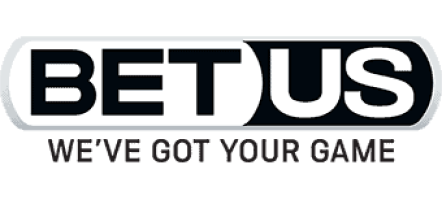

 475
475 21
21Top features:

Top features:
Bonus:
125% up to $3,125 475
475 21
21
 312
312 23
23Top features:

Top features:
Bonus:
50% up to $1,000 312
312 23
23
 112
112 15
15Top features:

Top features:
Bonus:
50% up to $250 112
112 15
15Our experts have chosen the best online sportsbooks in Connecticut, factoring in bonuses, range of markets, how competitive their odds are, and more.
BetUS is a prestigious online sportsbook launched in 1994. Licensed by the Curacao eGaming Authority, this trusted platform is the top choice for Connecticut-based players.
One key feature that sets BetUS apart is its broad range of betting markets. Whether you’re a fan of professional sports like NFL, NBA, or MLB, or prefer niche games like motor racing or golf, BetUS has you covered.
However, the most exciting feature of this Firepower Trading Ltd-owned operator is its six-tier VIP program. This program enables you to access exclusive features such as larger bonuses, free payouts, welcome free play, a dedicated phone number, and more.

Best Welcome Bonus in Connecticut
As a player, you’ll be welcomed with a generous bonus – 100% up to $2,500. This welcome bonus is up for grabs with a low minimum deposit requirement of $100.
This bonus can be activated with the JOIN125 code. Remember to clear its wagering requirement – 10x – in 14 days. You can use three credit cards or wire transfers to claim this traditional deposit bonus.However, crypto users in Connecticut can use Bitcoin, Bitcoin Cash, Litecoin, or Ethereum to grab a 200% up to $5,000 Crypto Sign-up Bonus. This bonus also has a minimum $100 deposit and a 14-day expiry. However, you must clear this bonus with a 15x rollover on sports. Use promo code JOIN200 to get this crypto offer.
Bovada was launched in 2011 and is licensed by the Curacao Gaming Commission, a well-known and reputable operator with whom sports bettors bet with confidence. Their mobile site is extremely well-designed and works well on iOS or Android devices.
Bovada accepts bets on most major competitions and events, so if you’re looking for NFL, NBA, MLB, or NHL betting, you are covered. In addition, they offer betting on most overseas competitions such as Wimbledon, the Premier League, or the European Golf Tour.
Bovada also features a comprehensive prop builder tool for the NFL.

Bovada allows Connecticut bettors to enjoy one of the best crypto sports welcome bonuses – a 75% up to $750. Use BTCSWB750 to grab this one-of-its-kind crypto promotion. Bitcoin, Litecoin, Bitcoin Cash, Bitcoin SV Deposit, and USDT qualify for this offer. This bonus has a 5x wagering requirement.
Bovada provides various banking options, including major credit cards and cryptocurrencies. However, the inclusion of MatchPay is a standout feature, allowing players to use e-wallet banking options in Connecticut.
The only thing we didn’t like is the 15.9% fee on credit card deposits.
MyBookie sportsbook is an excellent choice for sports betting enthusiasts. Established in 2014 and licensed by the Curacao eGaming Commission, this top CT site has quickly gained a reputation for being trustworthy and professional. Operated by Duranbah Ltd. N.V., it provides a secure environment for sports bettors in the US, including those in Connecticut.
MyBookie offers extensive coverage of sports and markets. You can bet on popular US leagues like the NBA, NFL, MLB, and NCAAF, as well as NCAAB and UFC. Betting options include moneylines, teasers, specials, futures, prop bets, and live in-play betting, giving you a wealth of exciting opportunities.
One of the reasons we place MyBookie among the top three CT sportsbooks is their ongoing contests, allowing players to win exciting real-money prizes.

Welcome Bonus
MyBookie offers an exciting 50% up to $1,000 in welcome sports bonus. Use promo code MYB50 when joining this excellent CT site, make at least a $50 deposit, and clear the 10x rollover within 30 days.
MyBookie accepts both traditional methods and cryptocurrencies. Traditional methods include DiscoverCard, American Express, Visa, MasterCard, and MoneyGram. The minimum deposit is $45 for these methods.
If you prefer cryptocurrencies, you can use Bitcoin, Litecoin, Tether, or Binance Coin for as low as $20 to join this top sportsbook. No maximum deposit limit is placed on the crypto banking options. However, the only downside of this site is that it offers fewer withdrawal methods. It currently includes Bitcoin, wire transfers, and e-checks.
| Sportsbook | Welcome bonus | Playthrough | Valid for | Min. deposit |
|---|---|---|---|---|
| BetUS | 100% Up to $2500 | 10x | 14 days | $100 |
| Bovada | 75% up to $750 | 5x | doesn’t expire | $20 |
| MyBookie | 50% Up to $1000 | 10x | 30 days | $50 |
| XBet | 50% Up to $500 | 7x | 15 days | $45 |
Not every offshore sportsbook is safe and, like any website, it’s important to research them before joining or handing over personal details.
However, our team of experts have verified that BetOnline, Bovada and XBet are safe and trustworthy sportsbooks that you can join with confidence.
After several sports betting bills in Massachusetts, Vermont, and Maine failed to reach the finish line, Connecticut became New England’s first competitive betting market in 2021.
Connecticut began licensing sportsbooks in September 2021, with retail sports betting taking the lead.
The Connecticut sports betting market was initiated months after Gov. Ned Lamont signed HB6451 into law in May 2021. The bill allowed CT sports betting, online casinos in Connecticut, and online lottery under the gaming agreements with the state’s two tribes. Online poker was also legalized under the bill, but no Connecticut internet poker sites have yet launched.
The updated contracts created three sports betting licenses. Mashantucket, who own Foxwoods Resort Casino, partnered with DraftKings to offer online and retail sports betting. Mohegan Sun Casino, owned by the Mohegan Tribe, maintained the tribal duopoly with a legal sports betting license. Connecticut Lottery secured the third license to offer online and retail Sportsbooks.
Connecticut sports betting licenses are good for 10 years with the state levying the industry at 13.75%.
Yes, online sports betting has been legal in Connecticut since October 2021. You can learn more about Connecticut gambling laws here.
However, while the state is new to officially licensing and regulating sportsbooks for online play, many CT residents are choosing to keep betting with the best offshore sports betting sites, such as the ones on our list, which offer a range of additional benefits like crypto deposits, higher betting limits, and anonymity.
The Connecticut Legislature approved House Bill 6451 in May 2021. It came after Lamont and tribal leaders agreed that the Connecticut Lottery would be empowered to offer a digital sports betting platform.
The Department of Consumer Protection governs sports betting in Connecticut. The CT Lottery, which is overseen by the Connecticut Lottery Corporation, supports the department.
Legal online Sportsbooks allow bettors aged 21 and over who are physically located in Connecticut to place online bets. However, most leading offshore sportsbooks like BetOnline and Bovada accept Connecticut players aged 18 or above.
There are just three legal online sports betting sites in Connecticut:
All the top Connecticut sports betting sites offer the following promotions to sports bettors in the state.
A risk-free bet is a promotion that refunds your initial bet if you lose it. For instance, BetOnline’s $25 Risk-Free Player Prop Wager is one of the best risk-free bets in Connecticut.
A deposit match is when bookmakers match a percentage of your deposit with bonus funds that you can use to bet. BetOnline’s 50% up to $1000 is the best deposit match bonus for Connecticut sports bettors.
A referral bonus rewards you for referring your friends. For instance, Bovada’s Refer-a-Friend Bonus allows you to earn up to $200 on your friend’s deposit. You even get an extra $75 if your friend deposits with Bitcoin.
Odds boosts increase the payout on a specific selection. Usually, the sportsbook will decide the selection to boost in advance, but some offer boosts that you can apply to any selection. BetOnline’s Odds Boosters allow you to get daily enhanced prices on certain sports bets.
Parlay insurance encourages bettors to try their luck again by offering exceptions, such as if you win all legs of your parlay except one, you will receive a refund.
Connecticut players can sometimes get a bonus without even making a deposit. Each of the sportsbooks we listed offer this promotion from time to time, so just make sure you keep your eyes peeled for it.
Leading CT sports betting sites are equally good for desktop and mobile users, allowing you an uninterrupted online gambling experience.
These top Connecticut sports betting apps are 100% optimized for both iOS and Android, and we rated Bovada as the best mobile sportsbook available to Connecticut residents. The providers we recommend on this page also offer web based HTML5 gameplay that will work in your mobile browser.
There are a variety of benefits to offshore sportsbooks such as higher deposit limits, huge bonuses, and the ability to use cryptocurrency as a banking method.
Using cryptocurrency offers a range of benefits in itself, such as anonymity and instant deposits and withdrawals.
XBet is among Connecticutʼs newer betting sites and has been available to Connecticut players since 2013―two years after the celebrated launch of Bovada.
Horse racing betting is legal in the Nutmeg State, and residents can place bets at 15 off-track facilities across the state. You can also bet on horse racing online using BetOnline and Bovada, which have fully-fledged online racebooks.
Although Connecticut currently has no live tracks, residents can bet on famous events like the Kentucky Derby, Preakness Stakes, and the Grand National.
While no legal CT Sportsbook allows election betting, you can bet on who will become the next U.S. President using offshore sites in CT.
For instance, Bovada offers an excellent range of betting lines and odds on the 2024 U.S. Presidential Election. BetOnline even allows bets on global politics, such as EU elections.
In this section we will explain some of the most popular betting markets that are available at offshore sportsbooks.
A moneyline bet is the simplest bet type. It involves two or three outcomes on the winner of an event. For instance, in an event where two teams or players are listed in the moneyline, you pick one team or player to win. In some sports, such as soccer, the tie is also listed.
Parlay betting is when you make multiple bets and tie them together into one bet. Each individual bet in a parlay is called a “leg”. You must win each leg to win the bet.
A sports bettor predicts the number of goals or points scored by the two teams or players combined and must bet “over” or “under” the total.
In points spread betting, you’re betting on how many points a team will win or lose by giving them a handicap. This bet type is especially good in an event with a clear favorite and where there may not be much excitement by betting on the moneyline favorite at short odds.
For example, in a football game, if Team A is clearly superior, we might give them a -7.5-point handicap prior to the start. If Team A then wins by 8 or more points, they are said to have beaten the -7.5 spread. Meanwhile, Team B beat the spread if they manage to lose by fewer than 8 points or even win the game.
A futures bet is a wager on an event that will unfold in the future. For instance, ‘Who will be the next Super Bowl champion?’ or ‘Who will win the 2024 U.S. Presidential Election?’ These types of bets can provide big odds and enjoyment over an entire season of sport, rather than just a single game.
A prop bet―short for proposition bet―has nothing to do with who wins the game but is generally tied to the performance of an individual player or event.
An example would be how many goals a player scores or yards a quarter-back will throw.
A live bet allows you to place wagers as a sporting event that is taking place. Odds will change dramatically throughout the game, depending on the events that take place.
All the bet types that local Sportsbooks don’t allow under the applicable laws of the jurisdiction where they operate are known as ‘prohibited bets’.
So, for instance, DraftKings Sportsbook cannot offer odds on political outcomes. Luckily, our top Connecticut sites provide exciting odds for election betting.
Always check the following metrics when choosing the best Connecticut sportsbook site.
Read as many reviews from independent reviewers as possible to identify strengths and weaknesses and how trustworthy a site might be before handing over your personal details.
There are hundreds of offshore sites, but only a few are licensed. For secure online gambling, only join a Connecticut Sportsbook with a proper operating license. Panama Gambling Commission and Curacao Gaming Commission are among the most respected jurisdictions.
Besides increasing your bankroll, promotional offers help you determine the financial viability of a Connecticut Sportsbook betting site. Only the bigger sports betting platforms can afford to offer the bigger bonuses.
The leading operators ensure their platforms are accessible to all kinds of players. Each of our recommended Connecticut sites have excellent websites that are suitable for both desktop and mobile users.
You must check that the CT site you want to join provides a wide range of bet types. Moneyline, totals, parlays, props, and futures are among of the most common bet types.
Better odds equal high payouts, which is why it pays to shop around. For instance, if one site offers -110 and the other offers -120 on the same team, you will receive a bigger return on your bet by taking the -110.
A great Connecticut sports betting site will always include multiple banking options. The objective is to facilitate bettors with as many banking methods as possible, from traditional methods to cryptocurrencies.
Regardless of how good a sportsbook may be, sometimes things go wrong, and you might need help. When your money is involved, it is vital that you get the help you need immediately, and therefore, customer support is important. Email, phone and live chat support are the most common customer support options.
You can bet on virtually all of the major sports leagues at our selected offshore betting sites, such as the NFL, NBA, MLB and NHL.
Although there are restrictions on in-state college teams in Connecticut, you can place wagers on your favorite Connecticut college teams using BetOnline and Bovada.
According to the Connecticut Department of Consumer Protection (CDCP), Connecticut posted a record handle of $164.2 million in October 2022. The previous highest was $158.1 million in January.
The October 2022 handle was also a 25.8% month-over-month increase and more than triple the $54.6 million from October 2021, the launch month of legal sports betting in Connecticut.
Legal online sports wagering brought in about $10.9 million in the first 10 months in Connecticut.
The following banking options are available for deposits and withdrawals at our recommended Connecticut online Sportsbooks.
You can deposit using Mastercard, Visa, AMEX, and Discover on Bovada and BetOnline.
Our selected Connecticut online Sportsbook each offer bank transfers. With a $50 minimum deposit and $9,500 maximum withdrawal, Bovada is our top recommendation for those looking for bank transfers.
Although offshore sites don’t offer e-wallets to US-based customers, Connecticut players can use many e-wallet banking methods, such as PayPal, when using Bovada. All you need to do is create a MatchPay account and connect any other e-wallet services you want to use.
The top Connecticut Sportsbooks allow Bitcoin deposits and withdrawals, which are free and instant.
Cryptos other than Bitcoin are called altcoins. Most leading Connecticut sites include altcoins such as Ethereum and Litecoin.
Connecticut doesn’t have many significant professional sports teams. However, its college teams draw significant interest among Connecticut bettors.
Many Connecticut players are also fans of professional sports teams from other states, particularly Massachusetts. So, you can also bet on Boston franchises, including the Boston Red Sox, Boston Celtics, and the New England Patriots.
Yes, online sports betting in Connecticut has been legal since October 2021.
You must be 21 years of age or above to bet online using local Connecticut sites. However, BetOnline and Bovada accept Connecticut players who are aged 18 or above.
Online wagering became legal after Gov. Ned Lamont signed an online gaming bill into law in May 2021.
Yes, Connecticut players can sign up and claim bonuses at offshore sites. Remember to provide promo codes to claim bonuses on BetOnline and Bovada.
The Department of Consumer Protection oversees online sports betting in Connecticut. The lottery is regulated by the Connecticut Lottery Corporation.
No, you can be a resident or just visit Connecticut to legally bet online in the Nutmeg State.
You can play daily fantasy sports in Connecticut using DraftKings.
For secure online betting in Connecticut, stick to the recommended offshore sites.
DraftKings Sportsbook is one of the three licensed operators in Connecticut.
FanDuel partners with the Mohegan Tribe to operate legally in Connecticut.
Bovada is licensed by Curacao to operate legally in Connecticut.
Yes, BetOnline has been operating legal online sports betting in Connecticut thanks to its Panama license.
MyBookie is another legal offshore online Sportsbook that operates in Connecticut.
BetUS is one of the first online Sportsbooks that began legal operations in Connecticut.
Are you ready to take your online gambling experience to the next level? Sign up for the LetsGambleUSA newsletter and get the latest news, exclusive offers, and expert tips delivered straight to your inbox.